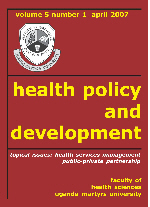
|
Health Policy and Development
Department of Health Sciences of Uganda Martyrs University
ISSN: 1728-6107
EISSN: 1728-6107
Vol. 2, No. 2, 2004, pp. 122-130
|
 Bioline Code: hp04023
Bioline Code: hp04023
Full paper language: English
Document type: Special Article
Document available free of charge
|
|
|
Health Policy and Development, Vol. 2, No. 2, 2004, pp. 122-130
| en |
Agricultural biotechnology for developing countries
Raney, Terri
Abstract
The Food and Agriculture Organization of the United Nations, in "The State of Food and Agriculture 2003-04", examines the potential of agricultural biotechnology to address the current and future needs of the world's poor and food insecure. Critics of biotechnology claim that technology is not the answer to the problems of poverty and hunger. They argue - correctly - that the world produces enough food to provide everyone with an adequate diet and that what is required is more equitable access by the poor. They extrapolate from these sensible observations to the mistaken conclusion that technological innovation is unimportant or even counter-productive in the fight against poverty and hunger (GRAIN, 2004) . This paper summarizes the findings of The State of Food and Agriculture and argues that technological innovation in agriculture, based on the best of modern science, is a necessary condition for sustainable economic growth and poverty alleviation. Biotechnology is not a panacea, but it is an essential part of the solution. This paper briefly reviews the range of biotechnology applications that can address problems of the poor. It also describes the role of technological innovation in promoting agricultural and economic growth and examines the key differences between the Green Revolution and the Gene Revolution. These differences - private sector dominance and safety and regulatory concerns - influence both the technologies being developed and their capacity to reach the poor. The economic evidence on the experience of developing countries so far with GM crops is reviewed, followed by policy recommendations to enhance the likelihood that the Gene Revolution will meet the needs of the poor.
|
| |
© Copyright 2004 - Department of Health Sciences of Uganda Martyrs University
Alternative site location: http://www.fiuc.org/umu/faculties/hsm/healthpolicy/index.html
|
|
